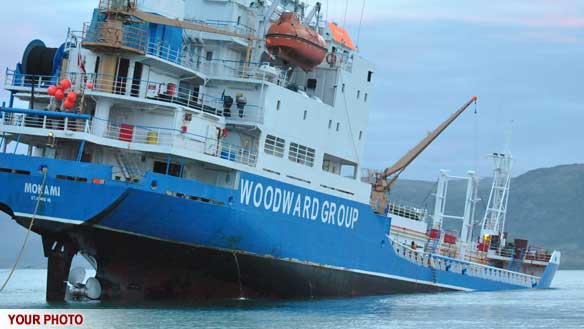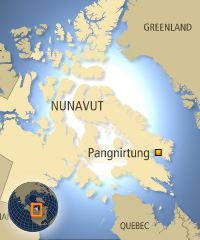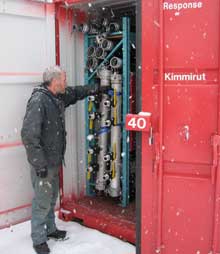Arctic Fuel Spill Fears Raised in Pangnirtung, Nunavut
Not prepared to handle large spill, Canadian official warns
 Residents in the Baffin Island hamlet of Pangnirtung, Nunavut, Canada, feared a large fuel spill would result after a tanker ship carrying fuel ran aground in the local harbour this week.
Residents in the Baffin Island hamlet of Pangnirtung, Nunavut, Canada, feared a large fuel spill would result after a tanker ship carrying fuel ran aground in the local harbour this week.
Witnesses say the tanker had finished unloading a bulk shipment of gasoline to the community on Sunday when the vessel drifted and became grounded, tipping at an angle in low tide.
“It looked like a shipwreck, quite frankly,” Ron Mongeau, Pangnirtung’s senior administrative officer, told CBC News in an interview.
“The front of the vessel was pointed down into the water,” he added. “The back end of the vessel was up on the rocks with the propeller fully exposed.”
No fuel spilled from the tanker, which was not damaged and was dislodged in high tide some hours later.
Pangnirtung, a community of about 1,325, is located 300 kilometres north of Iqaluit on Baffin Island.
‘Environmental disaster’ risk
 Mongeau said he couldn’t help but think about the hundreds of thousands of litres of gasoline still on board the ship when it ran aground.
Mongeau said he couldn’t help but think about the hundreds of thousands of litres of gasoline still on board the ship when it ran aground.
“Obviously when you see a tanker running aground, do the words ‘environmental disaster’ run through your mind really quickly?” he said.
The tanker belongs to the Woodward Group of Companies, which is under contract from the Nunavut government to deliver bulk fuel shipments to the territory’s remote communities.
Susan Makpah, director of the Nunavut government’s petroleum products division, said the company has assured her that there was no chance of a spill.
“At no time did the captain consider [the] ship or crew to be in any danger or any risk to the environment of any kind,” Makpah said from her office in Rankin Inlet.
But even without the risk, Makpah said the territorial government is investigating Sunday’s incident. Transport Canada will be notified, she added.
“We take it really seriously when incidents like this happen,” she said.
Not prepared for spill: official
Back in Pangnirtung, Mongeau wondered what would have happened if there had been a fuel spill near his community.
“We could have had a significant incident here for which we are totally unprepared to handle,” he said.
 The Canadian Coast Guard has been working to provide remote Nunavut communities with resources to handle fuel spills.
The Canadian Coast Guard has been working to provide remote Nunavut communities with resources to handle fuel spills.
This summer, the coast guard is shipping containers of spill response equipment to 19 small communities across the territory. So far, six kits have been put in place.
Even when all the kits have been delivered and implemented, officials say community members need to be trained on how to use them. That training is expected to happen sometime next year.
“The kits that we’ve constructed [and] designed were geared to deal with the loading and offloading, which were the high-probability incidents that were occurring — very small-volume response … during the ship-to-shore transfer of predominantly Arctic diesel,” said Larry Trigatti, the coast guard’s superintendent of environmental response.
Trigatti said the coast guard is prepared to handle larger spills as well, with 150 tonnes of spill containment gear ready to be flown to remote northern communities within days of an accident.



